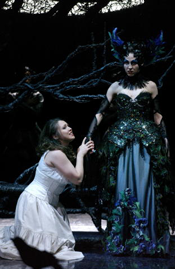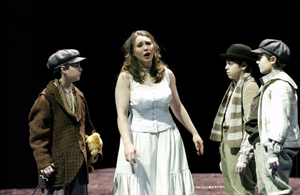
30 May 2007
Die Zauberflöte at the Volksoper
Serpents, abduction, magic flutes, a sacred priesthood and, of course….love, are a few of the elements Mozart used to comprise his mason-influenced collaboration with Emanuel von Schikaneder.
English Touring Opera are delighted to announce a season of lyric monodramas to tour nationally from October to December. The season features music for solo singer and piano by Argento, Britten, Tippett and Shostakovich with a bold and inventive approach to making opera during social distancing.
This tenth of ten Live from London concerts was in fact a recorded live performance from California. It was no less enjoyable for that, and it was also uplifting to learn that this wasn’t in fact the ‘last’ LfL event that we will be able to enjoy, courtesy of VOCES8 and their fellow vocal ensembles (more below …).
Ever since Wigmore Hall announced their superb series of autumn concerts, all streamed live and available free of charge, I’d been looking forward to this song recital by Ian Bostridge and Imogen Cooper.
Although Stile Antico’s programme article for their Live from London recital introduced their selection from the many treasures of the English Renaissance in the context of the theological debates and upheavals of the Tudor and Elizabethan years, their performance was more evocative of private chamber music than of public liturgy.
Evidently, face masks don’t stifle appreciative “Bravo!”s. And, reducing audience numbers doesn’t lower the volume of such acclamations. For, the audience at Wigmore Hall gave soprano Elizabeth Llewellyn and pianist Simon Lepper a greatly deserved warm reception and hearty response following this lunchtime recital of late-Romantic song.
For this week’s Live from London vocal recital we moved from the home of VOCES8, St Anne and St Agnes in the City of London, to Kings Place, where The Sixteen - who have been associate artists at the venue for some time - presented a programme of music and words bound together by the theme of ‘reflection’.
'Such is your divine Disposation that both you excellently understand, and royally entertaine the Exercise of Musicke.’
‘And there was war in heaven: Michael and his angels fought against the dragon; and the dragon fought and his angels, And prevailed not; neither was their place found any more in heaven … that old serpent … Satan, which deceiveth the whole world: he was cast out into the earth, and his angels were cast out with him.’
There was never any doubt that the fifth of the twelve Met Stars Live in Concert broadcasts was going to be a palpably intense and vivid event, as well as a musically stunning and theatrically enervating experience.
‘Love’ was the theme for this Live from London performance by Apollo5. Given the complexity and diversity of that human emotion, and Apollo5’s reputation for versatility and diverse repertoire, ranging from Renaissance choral music to jazz, from contemporary classical works to popular song, it was no surprise that their programme spanned 500 years and several musical styles.
The Academy of St Martin in the Fields have titled their autumn series of eight concerts - which are taking place at 5pm and 7.30pm on two Saturdays each month at their home venue in Trafalgar Square, and being filmed for streaming the following Thursday - ‘re:connect’.
The London Symphony Orchestra opened their Autumn 2020 season with a homage to Oliver Knussen, who died at the age of 66 in July 2018. The programme traced a national musical lineage through the twentieth century, from Britten to Knussen, on to Mark-Anthony Turnage, and entwining the LSO and Rattle too.
With the Live from London digital vocal festival entering the second half of the series, the festival’s host, VOCES8, returned to their home at St Annes and St Agnes in the City of London to present a sequence of ‘Choral Dances’ - vocal music inspired by dance, embracing diverse genres from the Renaissance madrigal to swing jazz.
Just a few unison string wriggles from the opening of Mozart’s overture to Le nozze di Figaro are enough to make any opera-lover perch on the edge of their seat, in excited anticipation of the drama in music to come, so there could be no other curtain-raiser for this Gala Concert at the Royal Opera House, the latest instalment from ‘their House’ to ‘our houses’.
"Before the ending of the day, creator of all things, we pray that, with your accustomed mercy, you may watch over us."
The doors at The Metropolitan Opera will not open to live audiences until 2021 at the earliest, and the likelihood of normal operatic life resuming in cities around the world looks but a distant dream at present. But, while we may not be invited from our homes into the opera house for some time yet, with its free daily screenings of past productions and its pay-per-view Met Stars Live in Concert series, the Met continues to bring opera into our homes.
Music-making at this year’s Grange Festival Opera may have fallen silent in June and July, but the country house and extensive grounds of The Grange provided an ideal setting for a weekend of twelve specially conceived ‘promenade’ performances encompassing music and dance.
There’s a “slide of harmony” and “all the bones leave your body at that moment and you collapse to the floor, it’s so extraordinary.”
“Music for a while, shall all your cares beguile.”
The hum of bees rising from myriad scented blooms; gentle strains of birdsong; the cheerful chatter of picnickers beside a still lake; decorous thwacks of leather on willow; song and music floating through the warm evening air.

Serpents, abduction, magic flutes, a sacred priesthood and, of course….love, are a few of the elements Mozart used to comprise his mason-influenced collaboration with Emanuel von Schikaneder.
The Wiener Volksoper’s 2007 production of Die Zauberflöte is rich with visual effects, including a large mechanical dragon that emerges from the depths of the stage, a vibrant rotating set complete with “living” statues who are elevated high above the stage; a gargantuan telescope and fire set the scene for what was unfortunately a mediocre production, other than a few glimmering aspects.
The Overture was well-effected but somewhat mechanical and it lacked in the necessary colours and shading that Mozart’s music demands. Conductor, Elisabeth Attl seemed to have little influence over the orchestra that in some moments seemed to be just going through the motions. The three ladies, sung by Edith Lienbacher, Sulie Girardi, and Andrea Bönig looked fabulous in matching gowns and hats (and later clad in leather and tattoos) complete with walking canes, however their singing was often strident and in what should be a unified harmonic ensemble there were inconsistencies in unity.
Die Königin der Nacht (Queen of the Night) was eloquently sung by Miriam Ryen, who had a brilliant and laser-like upper tessitura and beautiful agility in her coloratura passages, however the orchestra often overpowered her and thus obscured her musicality. Her Der Hölle Rache kocht in meinem Herzen was visually exciting with an electric red sky from which hung an enormous crescent moon. Some intonation problems affected her performance of this aria, that also lacked the tremendous rage that Mozart expected here.
Papageno was performed by Mathias Hausmann who possesses a lovely burnished baritone to match his consummate dramatic abilities. His Der Volgelfänger bin ich ja was not only amusing, but sung with much inflection and attention to detail. Unfortunately, the following entrance by Daniel Behle, as Tamino, left much to be desired. His Dies Bildinis ist bezanbernd schön lacked the brilliant sound that the aria requires and his acting was somewhat superficial throughout the opera. One wondered if he was really in love with Pamina or not.
Pamina’s entrance was visually wonderful, as she was dragged in by Monostatos (played by Wolfgang Gratschmaier) in a large net. American Soprano, Jennifer O’Loughlin’s Pamina was artistically beyond the rest of her cast. She effected every entrance with lovely spinning tones in a deep golden hue in her middle voice, and her musicality was well-suited to the lyricism Mozart demanded of a superb Pamina. The orchestra, however, was highly insensitive to Ms. O’Loughlin’s middle and lower registers and failed to match her musical nuances. A sensitive and believable actress, her Ach, ich Fühl’s es ist verschwunden was luscious and effected with impeccable diction, and well-floated pianissimi that give credit to her vocal technique.
Lars Woldt, in the role of the Sprecher, possessed a strong and well-projected voice, and his presence added to the overall dramatic impetus of the production. In addition, Kaiser Nkosi’s Sarastro opened Act II with strong dramatic and vocal qualities. His middle register was a lovely purple hue, however he lacked resonance in his lower tessitura, an unfortunate detail that affected the strength of Sarastro’s character.

Some of the most comical moments to which the audience responded belonged to Papageno and Papagena (comedically played alla Lucille Ball by Renée Schüttengruber). Complete with hot pink wig, and the whiniest fabricated voice, Papagena stole Papageno’s heart, and the audience’s as well. If anything stood out in this production it was the musicality and unity of the “Three Boys” who were played by the Wiener Sängerknaben. Mozart’s opera is imbued with many numerical elements in groups of three and these trios (the three spirits, the three ladies, and three priests in the temple) should be unified textually and harmonically. The three boys were perhaps the most precise musically and kudos go out to them for stealing the show. Although a visually interesting production, the orchestra often marred the musicality of the singers, and most bothersome was how members of the orchestra got up and left the pit during the opera and then returned to later, not only disturbing the dramatic action but also creating a general lack of continuity in the musical fabric.
Mary-Lou Vetere-Borghoff
PhD (ABD), M.A., Mus.B